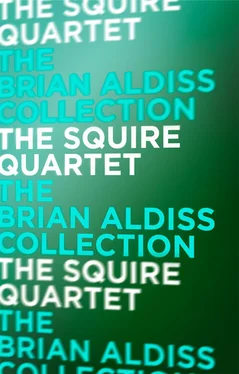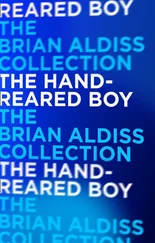Brian Aldiss - The Squire Quartet
Здесь есть возможность читать онлайн «Brian Aldiss - The Squire Quartet» — ознакомительный отрывок электронной книги совершенно бесплатно, а после прочтения отрывка купить полную версию. В некоторых случаях можно слушать аудио, скачать через торрент в формате fb2 и присутствует краткое содержание. Жанр: unrecognised, на английском языке. Описание произведения, (предисловие) а так же отзывы посетителей доступны на портале библиотеки ЛибКат.
- Название:The Squire Quartet
- Автор:
- Жанр:
- Год:неизвестен
- ISBN:нет данных
- Рейтинг книги:3 / 5. Голосов: 1
-
Избранное:Добавить в избранное
- Отзывы:
-
Ваша оценка:
- 60
- 1
- 2
- 3
- 4
- 5
The Squire Quartet: краткое содержание, описание и аннотация
Предлагаем к чтению аннотацию, описание, краткое содержание или предисловие (зависит от того, что написал сам автор книги «The Squire Quartet»). Если вы не нашли необходимую информацию о книге — напишите в комментариях, мы постараемся отыскать её.
The Squire Quartet — читать онлайн ознакомительный отрывок
Ниже представлен текст книги, разбитый по страницам. Система сохранения места последней прочитанной страницы, позволяет с удобством читать онлайн бесплатно книгу «The Squire Quartet», без необходимости каждый раз заново искать на чём Вы остановились. Поставьте закладку, и сможете в любой момент перейти на страницу, на которой закончили чтение.
Интервал:
Закладка:
‘I don’t believe that either, any more than you believe in my sympathies for the Greeks.’
They parted five minutes later, rather stiffly, and went their different ways.
Squire went to The Nag’s Head and phoned Laura Nye at her London address. He could hear the bell ringing in her flat, but it was not answered. On the following Tuesday he was due to go to London to film the last episode of ‘Frankenstein Among the Arts’, and would see Laura then. Meanwhile, he could only speculate on how she was passing the weekend, as he drove home.
The road north from Norwich, which casually followed the course of the River Wensum, was full of traffic. Squire switched on the radio and drove slowly, blanking out his thoughts by concentrating on the pleasure of the peaceful summer day. Nobody seemed in a particular hurry to reach the coast. Families were going to picnic and swim, no world was dying, there was no invisible and fateful drama such as Solzhenitsyn envisaged being enacted in these unguarded hours. No need for apprehension.
The first sight of Hartisham when coming from the south was the ruins of Hartisham Priory. The priory had been founded in the year 1131. It had once enshrined a relic of the Holy Cross, and had been frequently visited by King Henry III. Now little was left but the ruins of the gatehouse and the south wall, faced with knapped flint. Lumps of masonry stood here and there about the site, now in the care of the Ministry of Works. A few holiday-makers were inspecting the ruins. A child ran laughing through a stone door where the monks had walked in prayer. Squire drove slowly past, then stopped the car on the verge. He walked back to an ice-cream van parked near the ruin and bought three large tubs of strawberry whirl as a surprise for Teresa and the girls.
When he drove up to Pippet Hall, it was to find everything silent, and all windows and doors closed. Carrying the ice creams carefully, he unlocked the front door and went in. He called. There was no response. One of the cats paraded down the stairs, giving a miaow at every fourth step.
In his study, he found a note lying on his desk. He set the plastic cartons down in order to read it, recognizing Teresa’s untidy handwriting as he did so. It was brief.
Dear Tom,
I have to go away on a business matter that has cropped up. I am leaving the children with your sister at Blakeney. My mother will stay in Grantham. No doubt Matilda will look after you.
T.
He sat down at the desk, studying the sheet of notepaper, which looked all the stranger because it bore the Pippet Hall address embossed on it. The cat came to sit beside his chair, looking up at him expectantly before turning to lick its left shoulder. The sound of its rough tongue on the fur was the only noise in the room.
At one moment Squire looked up swiftly, thinking he saw a black figure at the french windows, peering in. A bird had flown by. Nobody was there. He was alone.
An early summer day, the sunshine faint on the brickwork of the house. The clumps of rhododendron bushes, which concealed the yard and garages from the front drive, spread a wedge of shadow across the most easterly corner of the house, shading the dining-room window; that window reflected a parade of people approaching the house, and dissected their figures among its glazing bars.
The parade comprised people of various periods, men and women and children. There were men in the three-cornered hats, knee-breeches and tight clothes of the eighteenth century, women in the high-waisted, low-necked dresses of the Regency, or in crinolines with shawls in a mid-Victorian fashion. There were ladies with shingled hair in frocks with low belts, and gentlemen in lounge suits and spats, together with chaps and chicks in jeans and leather jackets. All climbed the steps of the front porch and went into the house, the door of which stood wide to receive them.
Squire asked rhetorically, ‘What is man’s greatest invention? Some would say the Wheel, or the control of Fire, or cooking, or perhaps the domestication of animals. Some might say the internal combustion engine or the rockets that have taken men across space to the Moon. All these things have been immensely important in the rise of mankind. The list comprises things because our culture tends to think in terms of things, although we act in terms of style.
‘Not the least of the great inventions of the last two centuries is what you are looking at now, on the other side of this lawn. It is not just a house but an embodiment of style, the style of the Enlightenment which still plays its role in shaping our present.’
The viewpoint moved nearer to take in more clearly the house and the figures entering it.
‘There’s a vicar going in, one of Christ’s representatives on Earth. He is walking through a doorway which derives its style from a great portico shrine. He probably doesn’t care about that, as he goes in to sit beside a hearth designed after a miniature triumphal arch or an altar to the Lares. Do the farmer and his wife over there realize that the facade of the house is conceived in terms of a Classical Order, with the windows on its three floors gradated in height? Does that rather corpulent man – perhaps he is a successful draper – have a clear notion of the ideas of the Italian Andrea Palladio or of the English Lords Burlingham and Shaftesbury? And perhaps that young lady with the patched jeans doesn’t realize that she is entering a belated expression of the Renaissance of Roman Architecture on English soil.
‘To these people, and to most of the rest of us, this is simply a comfortable Georgian house. There are still thousands of them of all shapes and sizes all over the country, and the style has been imitated on various scales ever since: for almost two hundred years almost everyone had wanted to live in a Georgian house. What all these people do know is that this extraordinary stylistic phenomenon, which imposes on the domiciles of a small Protestant northern island the temple architecture of a long-vanished heathen Mediterranean culture, results in the most pleasant kind of house ever invented.’
The viewpoint had moved to the interior.
‘The Georgian house is sensibly laid out, easier to maintain than any previous style of home, comfortable, adaptable, and homely. “Home” is an English word, for which Palladio’s fellow-countrymen, for instance, have no word; and the Georgian house is a major contribution to civilization and stability. One finds it nowhere but England and Scotland, and Dublin, and its imitations everywhere.
‘We cannot live without myth. This house enshrines a myth, the myth that life is subject to constant improvement. The Georgian house is a product not only of architectural orders but of the concept of Order itself, to which the early eighteenth century heartily subscribed.
‘Having lived all my life in this particular house, I feel qualified to say that it does promote orderly conduct in the lives lived within its walls – or rather it tends to promote order among the disorderly jumble which constitutes the average life. It doesn’t enforce order, class order, like a Victorian house. It is more than a house: it is a style.
‘In the eighteenth century, there was agreement about style. There are now more people in the world and a greater divergence of taste. In consequence, we have wide divergences in style. Some would say that there is also a greater range of possibilities. That is true, although youth always tends to exaggerate the possibilities available. We are not creatures of determinism, but, unfortunately, the number of things we can do in one lifetime is limited.
‘We observe an example of that law of limitation in the Georgian style itself. I call it an English invention. So it is. But whilst the comfortable English squires and lords of the manor were busying themselves about these homes, the Continent of Europe was about something else – the Rococo. There is no Rococo in England, certainly none of its glories as we know them on the Continent. After the Civil War, we English seem to have settled down to gardening and a limited amount of religion. Instead of the ridiculously pretty baroque churches which grace Europe and South America, we have utilitarian chapels; instead of Fragonard and the great master of Rococo, Tiepolo, we have George Stubbs – what an English name! – and Tom Rowlandson. It’s all a question of style.’
Читать дальшеИнтервал:
Закладка:
Похожие книги на «The Squire Quartet»
Представляем Вашему вниманию похожие книги на «The Squire Quartet» списком для выбора. Мы отобрали схожую по названию и смыслу литературу в надежде предоставить читателям больше вариантов отыскать новые, интересные, ещё непрочитанные произведения.
Обсуждение, отзывы о книге «The Squire Quartet» и просто собственные мнения читателей. Оставьте ваши комментарии, напишите, что Вы думаете о произведении, его смысле или главных героях. Укажите что конкретно понравилось, а что нет, и почему Вы так считаете.












